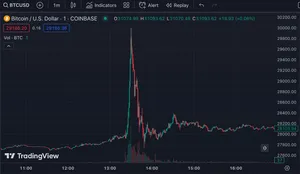Reddit's attempt to blockchainify their signature Reddit karma has come to an end as the company has decided to pull the plug on the feature. The idea was that users could "own a piece of their community" (what?) by racking up points for their positive contributions, which they could then spend on perks like custom badges.Reddit attributed the decision to scaling difficulties, regulatory uncertainty, and the quantity of resources the company found itself having to put into the feature. The tokens were only used on a handful of subreddits, and the team had migrated them from the Ethereum blockchain to the Arbitrum Nova L2 chain, but despite that scaling continued to be a problem.
The news caused a massive dive in the prices of $MOON and $BRICK, the two Reddit tokens, as holders tried to exit their positions before the tokens became useless. Some angrily accused Reddit of rug-pulling, threatening legal action. One wrote, "I wish you guys knew how reckless this decision is and how many people you've hurt." Some accused subreddit moderators of selling when they learned about the decision an hour before it was made public.
Others were delighted at the news, however. One wrote, "Thank the effing Lord. This moons caused so much shit tier spamming for over a year."









